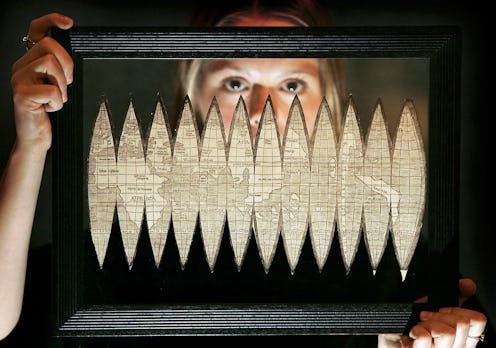Life
2018 Was A Major Year For Women In STEM — Here Are 5 Highlights

In many ways, 2018 was a groundbreaking year. For women in science, technology, engineering and mathematics, and girls who hope one day to be changing the world through STEM, it's been a showcase of the power of female-led science and innovation. There have also been challenges and powerful lessons, but 2018 for women in STEM was intriguing, barrier-breaking and full of new and exciting discoveries.
Women continue to be on the rise in traditionally male-dominated STEM fields. Business Insider's annual list of the most powerful female engineers in the world includes, in 2018, head engineers at Google, Adobe, Lockheed Martin, Apple, SpaceX, and General Motors, who are not only breaking barriers as women in STEM, but also as women from diverse racial backgrounds. That's important in STEM, as data collected in March 2018 indicates that Black, Latinx and other women of color are deeply underrepresented in many STEM fields. Increasingly, the world is recognizing and promoting female STEM pioneers, whether through prizes like the L'Oreal UNESCO and Nature Research Awards or via initiatives to inspire the female scientists of the future; the "She Can STEM" videos connecting girls with heroes at game studios and NASA were a highlight of the year. Great science, amazing awards and some massive leaps forward: 2018 marked a watershed year for women in STEM worldwide. Here are five of the best moments.
1They Broke Nobel Prize Barriers
The scientific Nobel Prizes in 2018 made huge headlines for the fact that they (gasp) included women. Professor Donna Strickland became the first woman in 55 years to win the Nobel Prize for Physics, joining a very small cadre that includes Marie Curie, and Professor Frances Arnold shared joint honors in the Nobel Prize for Chemistry, the fifth woman ever to win the award. The awards came a day apart and caused widespread rejoicing among advocates for women in STEM.
2A Scientist Donated Her Winnings For Diversity
2018 was also the year that Professor Dame Jocelyn Bell Burnell, whose male supervisor won the 1974 Nobel Prize for her discoveries around pulsars, made her move to change the way academic science works. In September Burnell received the $3 million Special Breakthrough Prize in Fundamental Physics for her life's work. She immediately announced a plan to use it to create scholarships to enable women and underrepresented minorities, including refugees, to study physics. It was a groundbreaking move and may fundamentally shift the physics landscape in the future.
3Women Made Incredible Discoveries
Women were part of some of the biggest discoveries and achievements in STEM in 2018. The NASA team that launched and landed the InSight probe on Mars includes many women, including Mission Ops System Lead Pauline Hwang, while female-led teams made groundbreaking discoveries worldwide.
Professor Holly Betts led a study that revolutionized the timescale of life's origin on earth, a team under Professor Evelyn Teller created lab-grown human eggs for the first time, and Zhengchu Tan was part of a team that created 3D-printed replacement brain and lung structures. Professor Stephanie Page is also behind the development of a promising new male contraceptive that may shift the way we use birth control.
4It Was A Great Year For Visibility, Too
In 2018, it became much more difficult to make excuses for excluding women from STEM conversations because of just how visible they are. Researcher Jess Wade made headlines in July when she revealed she'd written around 270 Wikipedia profiles for under-recognized female scientists in the past year alone, in an attempt to give them the public recognition they deserve. Request A Scientist, which makes female scientists available to anybody who's suddenly discovered their academic panel is all-male, launched in 2018 to make it impossible to say "we just couldn't find a qualified woman." These kinds of changes not only make it easier to discover the accomplishments of women in STEM, but also makes it harder for others to write them off.
5Science Experienced Its #MeToo Moment
As in many other industries, STEM experienced its own #MeToo movement in this past year. Shawna Williams, writing for The Scientist, describes how different institutions set rules in place to investigate harassment allegations, following allegations that high-profile scientists, including astrophysicist Neil DeGrasse Tyson, engaged in alleged sexual misconduct. (DeGrasse Tyson denied the allegations in a Facebook post.) Separately, on Nov. 1, Google employees worldwide staged a walkout to protest against the company's alleged culture of sexual harassment and gender and racial inequality.
In a proactive step, MIT also awarded scientists Sherry Marts and BethAnn McLaughlin its $250,000 "Disobedience Award"in November for their role in promoting #MeToo in science. Marts and McLaughlin, who share the award with #MeToo founder Tarana Burke, have pushed the #MeToo movement in science forward radically, and the award is a recognition of their work — and how far there is still to go.
6
Studies continue to confirm that girls and women have just as much 'natural aptitude' as men when it comes to STEM subjects. Hopefully, as we greet 2019, we'll keep the golden moments of 2018 in mind and break even more barriers in STEM for women worldwide.